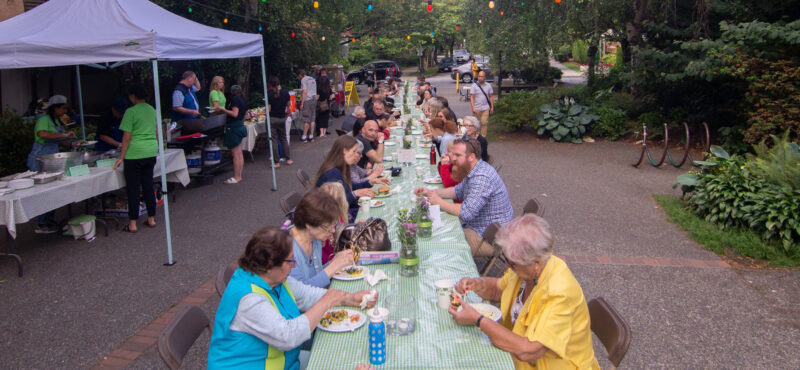Phone: 604-683-2554 | Email: welcome@gordonhouse.org
7 tips you missed at Let’s Grow!
by Joy Gyamfi.
Young Ideas is a program run out of Gordon Neighbourhood House. We are a group of volunteers that plan events, workshops, and activities for adults aged 20-39 in the West End. Our aim is to reduce social isolation and have a fun time doing in. On Sunday, May 1st, we held a gardening workshop called Let’s Grow: Homegrown Herb Garden.
During the workshop, Gordon House’s Farmer Joey Liu taught participants how to plant, water, and harvest herbs. If you weren’t able to make our workshop, check out some of the tips Joey gave below!

- Herbs have different growing patterns.
Perennial herbs like mint and oregano grow year after year. They are the most popular because they provide a continuous harvest. Biennial herbs like parsley complete their plant cycle in two years. In the first year, they grow leaves, go dormant in the fall, and then flower and produce seeds before dying. Annual herbs like cilantro must be replanted every year.
- Try companion planting.
Certain plants and herbs go well together. For example, dill grows really well with cucumbers. Basil will improve the flavour of tomatoes. Chives will improve the flavour of carrots. Tarragon will improve the flavour of any neighbouring vegetable. If you want to repel pests like aphids, beetles, and flies, strong smelling plants like lavender and sage can keep bugs away from your garden.

- Growing plants in shade is possible.
While most herbs need full sun to grow, certain herbs such as parsley, mint, lemon balm, and sometimes chives are easier to grow in partial shade. If you want to try growing other plants, it’s best to try ones that are already established seedlings.
- Planting seeds.
Use potting soil if you are planting into a container. Organic soil is best for planting directly into the ground. If using potting soil, mix it with water first so the seeds are entering a damp environment. Next, make a hole in the soil 2-3 times deeper than the size of the seed. Don’t make the hole too deep or else the seeds may get lost in the soil. The seeds can then be planted and covered with the surrounding soil. Seeds typically take 7-14 days to sprout. Before sprouting, leave your pot in an unlit room temperature area and check on it every few days to water.

- How to transplant herbs.
First, dig a hole as deep as the pot the herb was in or as long as the roots were. Loosen up the soil of the plant so that the roots are spread out instead of clumped together. Some plants can be divided and planted into separate gardens. The plant can then be inserted into the ground and surrounded with the dug-up soil. Give the surrounding soil a gentle pat so the roots make contact with the soil.

- Watering
Plants dry out faster in pots or containers because they can’t draw water out from the ground. During hot summer months, you can water your herbs every 2-3 days. It’s good to water early in the morning or the evening. If the soil becomes very dry, water the plant a little bit at a time in the centre of the soil. If your pot comes with a dish, you can water the dish so that the soil draws water upwards and gets to the roots first. What’s most important is to water the base of the plant and not the leaves. The roots absorb the water to grow.
- Pot size is important.
When planting with seeds, it’s important to think about the germination rate (how many seeds will grow) and how big the plant will get when deciding the size of your pot. Every year you might need to get a slightly bigger pot for your plant.
- Herbs can grow year round!
Check out this great resource for exact times on when to plant your herbs.

After the workshop, participants were able to put Joey’s knowledge to practical use by putting meals together with freshly harvested herbs from Gordon Neighbourhood Houses’ community herb garden. We made herb butter with sage, hummus with parsley and chives, and fruit salad with mint.
Even as a GNH employee myself, I was awed by how much I learnt and how well Joey facilitated the workshop. While I’ve written 7 tips about gardening and how to take care of plants, I’d like to add another: Attending events, classes, or workshops put on by community hubs like Gordon Neighbourhood House is beneficial in so many ways. You might just surprise yourself.
*Photography by Matt Schroeter
Joy Gyamfi is a Young Ideas Program Assistant and has been at GNH for about a year. She is currently studying Psychology and English Literature at UBC. When she’s not working or studying, Joy can be found volunteering with Black Lives Matter Vancouver, the Crisis Centre, or in a research lab at UBC.



